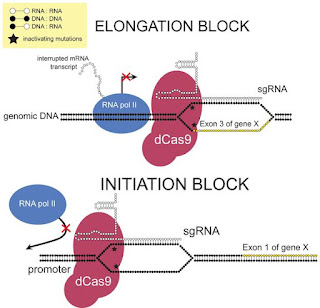To be honest, I haven't looked at the scientific papers behind CRISPR, but I've read a lot of lay articles about this genomic editing technique. As I understand, CRISPR stands for clustered regularly interspaced short palindromic repeats and represents sections of DNA that confers resistance to foreign genetic elements. They are found in bacteria and act as a way to recognize and cut out foreign DNA sequences.
The applications of this system are staggering. By using CRISPR and associated genes (called Cas), scientists are able to precisely and easily manipulate the genetics of most cells, including human ones. The technology has been used to knock out specific genes and add specific genetic sequences. Genes can be turned on or off in almost any organism. Most importantly, though, this technology is easy to use and effective.
Various laboratories around the world are using CRISPR/Cas to create disease-resistant crops, mosquitoes that won't spread malaria, yeasts that make biofuels, and animal models of various diseases. The beneficial implications are profound; we really might be entering an age where genetic modification is widespread. But the dangers are clear; such technologies can be used for evil; bioterrorists could conceivably create diseases that are much more virulent and deadly.
One of the most debated controversies, however, is the genetic editing of germline cells. The technology can be used to change the genomes of sperm, eggs, and embryos, and such changes would be permanent and passed onto offspring. This is really close to "playing God." The changes that we make might have dramatic unforeseen consequences. Without close scientific scrutiny, research, and forethought, embryo engineers may cause irrevocable damage to the human genome. We don't yet understand how all our genes interact, and we wouldn't know the implications of altering one gene, even if we did so with admirable intent.
In addition, the ability to have "designer babies" is ethically fraught. If we edit the genome to eliminate sickle cell disease, for example, what does that say about living people with sickle cell? It becomes a slippery slope to social Darwinism and eugenics by saying certain types of people should not exist. What if unethical genetic engineers moved from diseases to other traits like height or intelligence? Such possibilities are really not that far off; the dangers of unregulated genetic editing of embryos really worry me.
I don't pay that much attention to basic science breakthroughs these days; although I would love to stay current with such things, it just doesn't apply to my day-to-day life. Discoveries like this, however, catch my attention because of the widespread scientific, medical, cultural, social, and ethical implications. The ability to engineer genomes is a potential gamechanger in medical research, agriculture, biology (some scientists are considering reviving extinct species), bioengineering, and a dozen other applications. But it can be ethically fraught if we start playing God and exerting our own will on the forces of evolution.
Image shown under Creative Commons Attribution Share-Alike License, from Wikipedia.
Thursday, July 28, 2016
Subscribe to:
Post Comments (Atom)




No comments:
Post a Comment